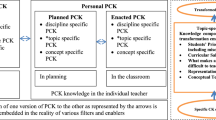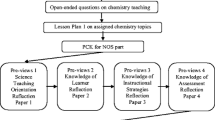Abstract
In science education, learner-centred classroom practices are widely accepted as desirable and are associated with responsive and reformed kinds of teacher beliefs. They are further associated with high-quality Pedagogical Content Knowledge (PCK). Topic-Specific Pedagogical Content Knowledge (TSPCK), a version of PCK defined at topic level, is known to enable the transformation of topic content into a form accessible to learners. However, little is known about teacher science beliefs in relation to TSPCK and therefore the nature of likely associated classroom practices. In this study, we investigated the relationship between TSPCK and underlying science teacher beliefs following an intervention targeting the improvement of TSPCK in the topic chemical equilibrium. Sixteen final year pre-service chemistry teachers were exposed to an intervention that explicitly focussed on knowledge for transforming the content of chemical equilibrium using the five knowledge components of TSPCK. A specially designed TSPCK instrument in chemical equilibrium and the Teacher Belief Instrument (TBI) were used to capture written responses in pre- and post-tests. Additional qualitative data was collected from audio-recorded discussions and written responses from an open-ended question asked before and after the intervention. Two key findings emerged from the study. Firstly, the development of TSPCK was linked to shifts in underlying science teacher beliefs in the direction of learner-centred teaching for the majority of pre-service teachers. Secondly, this shift was not evident for all, as for some there was development of TSPCK without a shift from teacher-centred beliefs about science teaching.










Similar content being viewed by others

Notes
The CoRe was used without the associated PaP-eR because the focus was on capturing and portraying evidence of a developing TSPCK during the intervention rather than reflections which would be appropriately captured through the PaP-eR.
References
Abell, S.A. (2008). Twenty years later: Does pedagogical content knowledge remain a useful idea? International Journal of Science Education, 30(10), 1405–1416.
Anderson, D. (2015). The nature and influence of teacher beliefs and knowledge on the science teaching practice of three generalist New Zealand primary teachers. Research in Science Education, 45, 395--423.
Bilgin, I. (2006). Promoting pre-service elementary students’ understanding of chemical equilibrium through discussions in small groups. International Journal of Science and Mathematics Education, 4(3), 467–484.
Boone, W., & Rogan, J. (2005). Rigour in quantitative analysis: the promise of Rasch analysis techniques. African Journal of Research in SMT Education, 9(1), 25–38.
Friedrichsen, P. J., Van Driel, J. H., & Abell, S. K. (2011). Taking a closer look at science teaching orientations. Science Education, 95, 358–376.
Gabel, D. (1999). Improving teaching and learning through chemistry education research: a look to the future. Journal of Chemical Education, 76(4), 548–554.
Geddis, A. N., & Wood, E. (1997). Transforming subject matter and managing dilemmas: a case study in teacher education. Teaching and Teacher Education, 13(6), 611–626.
Gess-Newsome, J. (1999). Pedagogical content knowledge: an introduction and orientation. In J. Gess-Newsome & N. Lederman (Eds.), Examining pedagogical content knowledge (pp. 3–20). Dordrecht: Kluwer.
Gess-Newsome, J. (2015). A model of teacher professional knowledge and skill including PCK: Results of the thinking from the PCK Summit. In A. Berry, P. Friedrichsen & J. Loughran (Eds.), Re-examining Pedagogical Content Knowledge in Science Education (pp. 28--42). London: Routledge.
Grossman, P. L. (1990). The making of a teacher: teacher knowledge and teacher education. New York: Teachers College.
Jang, S. J. (2011). Assessing college students’ perceptions of a case teacher’s pedagogical content knowledge using a newly developed instrument. Higher Education, 61(6), 663–678.
Johnson, R. B., & Onwuegbuzie, A. J. (2004). Mixed methods research: a research paradigm whose time has come. Educational Researcher, 33(7), 14–26. doi:10.3102/0013189X033007014.
Jones, M. G., & Carter, G. (2007). Science teacher attitudes and beliefs. In S. K. Abell & N. G. Lederman (Eds.), Handbook of research on science education (pp. 1067–1104). New Jersey: Mahwah.
Jüttner, M., & Neuhaus, B. J. (2012). Development of items for a pedagogical content knowledge test based on empirical analysis of pupils’ errors. International Journal of Science Education, 34(7), 1125–1143.
Kane, M. (2012). All validity is construct validity or is it? Measurement, 10, 66–70. doi:10.1080/15366367.2012.681977.
Klafki, W. (1958). Didaktik analysis as the core of preparation of instruction. London: Lawrence Erlbaum Associates.
Loughran, J. J., Berry, A., & Mulhall, P. (2004). In search of pedagogical content knowledge in science: developing ways of articulating and documenting professional practice. Journal of Research in Science Teaching, 41(4), 370–391.
Loughran, J. J., Berry, A., & Mulhall, P. (2006). Understanding and developing science teachers pedagogical content knowledge. Rotterdam: Sense.
Luft, J. (2009). Beginning secondary science teachers in different induction programmes: the first year of teaching. International Journal of Science Education, 31(17), 2355–2384.
Luft, J., & Roehrig, G. H. (2007). Capturing science teachers’ epistemological beliefs: the development of the teacher beliefs interview. Electronic Journal of Science Education, 11(2).
Luft, J., Firestone, J. B., Wong, S. S., Ortega, I., Adams, K., & Bang, E. (2011). Beginning secondary science teachers induction: a two-year mixed methods study. Journal of Research in Science Teaching, 48(10), 1199–1224.
Magnusson, S., & Krajcik, J. (1993). Teacher knowledge and representation of content in instruction about heat energy and temperature. [ERIC Document Reproduction Service No. ED387313].
Magnusson, S., Krajcik, J., & Borko, H. (1999). Nature sources and development of pedagogical content knowledge for science teaching. In J. G. Newsome & N. G. Lederman (Eds.), Examining pedagogical content knowledge: the construct and its implications for science education (pp. 95–132). Dordrecht: Kluwer.
Mansour, N. (2013). Consistencies and inconsistencies between science teachers’ beliefs and practices. International Journal of Science Education, 35(7), 1230–1275. doi:10.1080/09500693.2012.743196.
Mavhunga, M.E., & Rollnick, M. (2011). The development and validation of a tool for measuring topic specific Pedagogical Content Knowledge (PCK) in chemical equilibrium paper presented at the European Science Education Research Association (ESERA) Lyon, France. http://www.esera.org/media/ebook/strand3/ebook-esera2011_MAVHUNGA-03.pdf. Accessed 20 Dec 2014.
Mavhunga, E., & Rollnick, M. (2013). Improving PCK of chemical equilibrium in pre-service teachers. African Journal of Research in Mathematics, Science and Technology Education, 17(1--2), 113–125.
Mehmet, A., & Zubeyde, D. K. (2014). Exploring challenges of assessing pre-service science teachers’ pedagogical content knowledge (PCK). Asia-Pacific Journal of Teacher Education, 42(2), 147–166. doi:10.1080/1359866X.2014.890696.
Nezvalová, D. (2011). Researching science teacher pedagogical content knowledge. Problems of Education in the 21st Century, 35, 104--118.
Nilsson, P. (2008). Recognizing the needs—student teachers’ learning to teach from teaching. Nordina, 4(1), 284–299.
Nilsson, P., & Loughran, J. (2011). Exploring the development of pre-service science elementary teachers’ pedagogical content knowledge. Journal of Science Teacher Education, 23, 699--721.
Ono, Y., & Ferreira, J. (2010). A case study of continuing teacher professional development through lesson study in South Africa. South African Journal of Education, 30, 59–74.
Park, S., & Chen, Y. (2012). Mapping out the integration of the components of pedagogical content knowledge (PCK): Examples from high school biology classrooms. Journal of Research in Science Teaching, 49(7), 922–941. doi:10.1002/tea.21022.
Park, S., & Oliver, J. S. (2008). Revisiting the conceptualisation of pedagogical content knowledge (PCK): PCK as a conceptual tool to understand teachers as professionals. Research in Science Education, 38, 261–284.
Riese, J., & Reinhold, P. (2009). Measuring physics student teachers’ pedagogical content knowledge as an indicator of their professional action competence. Paper presented at the European Science Education Research Association 2009 Conference, Istanbul, Turkey. http://www.naturfagsenteret.no/esera/. Accessed 10 Feb 2014.
SAIRR. (2012). Unemployment: progress at last, maybe. Fast facts. Johannesburg, South Africa: South African Institute of Race Relations.
Shulman, L. S. (1986). Those who understand: knowledge growth in teaching. Educational Researcher, 15(2), 4–14.
Shulman, L. S. (1987). Knowledge and teaching: foundations of the new reform. Harvard Educational Review, 57(1), 1–22.
Teddlie, C., & Tashakkori, A.(2009). Foundations of mixed methods research. Integrating quantitative and qualitative approaches in the social and behavioral sciences: Thousand Oaks, CA: Sage.
Tepner, O., & Witner, S. (2011) Comparison of pre-service and in-service teachers’ content knowledge and pedagogical content knowledge in chemistry. In NARST Annual International conference, Orlando, Florida, April 3-6.
Tyson, L., Treagust, D. F., & Bucat, B. (1999). The complexity of teaching and learning chemical equilibrium. Journal of Chemical Education, 76(4), 554–557.
Van Driel, J. H., & Graber, W. (2002). The teaching and learning of chemical equilibrium. In J. K. Gilbert, O. D. Jong, R. Justi, D. F. Treagust, & J. H. Van Driel (Eds.), Chemical education: towards research-based practice (pp. 271–292). London: Kluwer.
Vavrus, F., Thomas, M., & Bartlett, L. (2011). Ensuring quality by attending to inquiry: learner-centred pedagogy in Sub-Saharan Africa. Addis Ababa: UNESCO International Institute for Capacity Building in Africa.
Veal, W. R. (2004). Beliefs and knowledge in chemistry teacher development. International Journal of Science Education, 26, 329–351.
Veal, W. R., & MaKinster, J. G. (1999). Pedagogical content knowledge taxonomies. Electronic Journal of Science Education, 3(4). http://unr.edu/homepage/crowther/ejse/ejsev3n4.html. Accessed 15 Jan 2015.
Weimer, M. (2013). Learner-centered teaching: five key changes to practice (2nd ed.). San Francisco: Jossey-Bass.
Wright, B. D., & Masters, G. (1982). Rating scale analysis. Chicago: Mesa.
Acknowledgement
This project was kindly financially supported by the Sasol Inzalo Fund and the Marang Centre.
Author information
Authors and Affiliations
Corresponding author
Appendix 1
Appendix 1
Appendix 2
Rights and permissions
About this article
Cite this article
Mavhunga, E., Rollnick, M. Teacher- or Learner-Centred? Science Teacher Beliefs Related to Topic Specific Pedagogical Content Knowledge: A South African Case Study. Res Sci Educ 46, 831–855 (2016). https://doi.org/10.1007/s11165-015-9483-9
Published:
Issue Date:
DOI: https://doi.org/10.1007/s11165-015-9483-9



